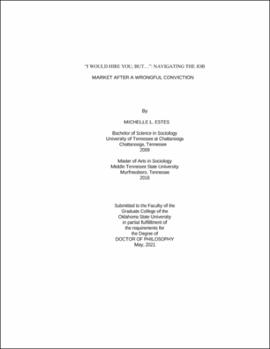| dc.contributor.advisor | Sittner, Kelley | |
| dc.contributor.author | Estes, Michelle L. | |
| dc.date.accessioned | 2021-09-24T13:32:59Z | |
| dc.date.available | 2021-09-24T13:32:59Z | |
| dc.date.issued | 2021-05 | |
| dc.identifier.uri | https://hdl.handle.net/11244/330871 | |
| dc.description.abstract | Wrongful convictions continue to receive increased attention among scholars and wider society. The majority of attention focuses on the causes of wrongful convictions and trying to estimate their occurrences. Far less is known about the community reintegration experiences of wrongfully convicted individuals (WCI). To address the limitations of current literature, this study utilizes life course perspective and stigma to examine the community reentry experiences of WCI specifically focusing on aspects of employment. Employment has been shown to be a critical component of the community reintegration experience, but currently no studies focus on how those managing a wrongful conviction navigate the job market. Utilizing semi-structured interviews with Innocence Organizational employees and wrongfully convicted individuals, this study explores how wrongful conviction impacts employment. Findings show that participants are on one of two courses in terms of employment before their incarceration. One course shows that participants are wrongfully incarcerated at incredibly young ages, preventing them from having any type of employment history; the other course indicates that participants were arguably on a positive employment trajectory, making good wages and enjoying their jobs. Once wrongfully incarcerated, participants are often limited in the educational and training programs in which they can enroll due to the long sentences they were given. Once released, participants had difficulty finding employment due to large gaps in their work history, a criminal conviction on their record, and the attached stigma of incarceration. Findings also show that wrongfully convicted individuals are in a unique situation because they are often released quickly with no community reentry plan and do not qualify for the same services as those released on probation or parole. I argue for community and policy reform to aid WCI in their community reintegration processes. | |
| dc.format | application/pdf | |
| dc.language | en_US | |
| dc.rights | Copyright is held by the author who has granted the Oklahoma State University Library the non-exclusive right to share this material in its institutional repository. Contact Digital Library Services at lib-dls@okstate.edu or 405-744-9161 for the permission policy on the use, reproduction or distribution of this material. | |
| dc.title | "I would hire you, but...": Navigating the job market after a wrongful conviction | |
| dc.contributor.committeeMember | Mix, Tamara | |
| dc.contributor.committeeMember | McLaughlin, Heather | |
| dc.contributor.committeeMember | Townsend-Bell, Erica | |
| osu.filename | Estes_okstate_0664D_17127.pdf | |
| osu.accesstype | Open Access | |
| dc.type.genre | Dissertation | |
| dc.type.material | Text | |
| dc.subject.keywords | employment after incarceration | |
| dc.subject.keywords | inequality | |
| dc.subject.keywords | life course | |
| dc.subject.keywords | qualitative methods | |
| dc.subject.keywords | stigma | |
| dc.subject.keywords | wrongful convictions | |
| thesis.degree.discipline | Sociology | |
| thesis.degree.grantor | Oklahoma State University | |
